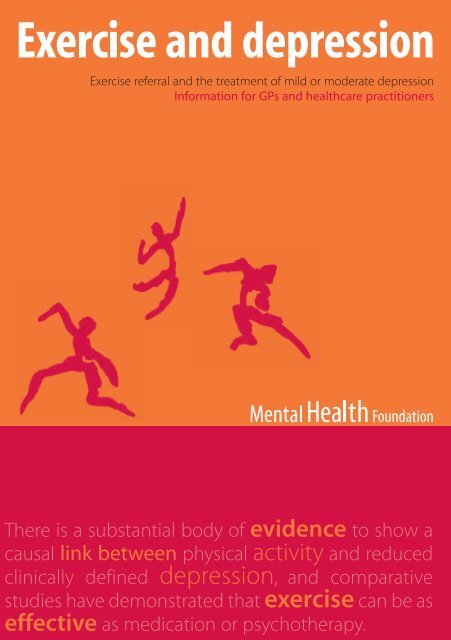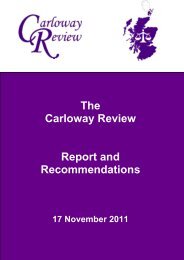Exercise and depression
Exercise and depression
Exercise and depression
Create successful ePaper yourself
Turn your PDF publications into a flip-book with our unique Google optimized e-Paper software.
<strong>Exercise</strong> <strong>and</strong> <strong>depression</strong><br />
<strong>Exercise</strong> referral <strong>and</strong> the treatment of mild or moderate <strong>depression</strong><br />
Information for GPs <strong>and</strong> healthcare practitioners<br />
There is a substantial body of evidence to show a<br />
causal link between physical activity <strong>and</strong> reduced<br />
clinically defined <strong>depression</strong>, <strong>and</strong> comparative<br />
studies have demonstrated that exercise can be as<br />
effective as medication or psychotherapy.
Treating <strong>depression</strong> in primary care<br />
Treating <strong>depression</strong> places a huge burden on GPs <strong>and</strong> primary care staff – up to<br />
30 per cent of consultations relate to a mental health problem 1 , <strong>and</strong> <strong>depression</strong> is<br />
the most common mental disorder found in community settings. 2<br />
For several decades, the st<strong>and</strong>ard firstline treatment response to <strong>depression</strong> in<br />
primary care has been medication. However, in recent years, scientists, regulatory<br />
bodies <strong>and</strong> clinical guidelines have questioned the wisdom of prescribing<br />
antidepressants in some circumstances, especially to people with mild <strong>depression</strong>.<br />
• As well as troublesome side effects <strong>and</strong> withdrawal symptoms, research shows<br />
that in some people, certain antidepressants can increase the risk of self-harm<br />
<strong>and</strong> suicide. 3 4<br />
• Guidance for clinicians published by the National Institute For Clinical Excellence<br />
in December 2004 states that: “Antidepressants are not recommended for the<br />
initial treatment of mild <strong>depression</strong>, because the risk-benefit ratio is poor.” 5<br />
This has created a dilemma for many practitioners. Faced every day with people<br />
desperate for help, there seem to be few options. New research by the Mental<br />
Health Foundation shows that GPs would like greater access to alternatives, but<br />
that there are shortages of, or there are long waiting lists for, psychological<br />
treatments. 6 According to this research:<br />
57 per cent of GPs believe antidepressants are prescribed too often.<br />
78 per cent of GPs have prescribed an antidepressant despite believing that an<br />
alternative approach might have been more appropriate, <strong>and</strong> 66 per cent have<br />
done so because a suitable alternative was not available.<br />
However, there is a well-evidenced treatment for <strong>depression</strong> that is currently<br />
underused in primary care. That option is exercise therapy, <strong>and</strong> it is increasingly<br />
available through organised referral schemes. The following pages explain how<br />
exercise therapy can help people with <strong>depression</strong> <strong>and</strong> answers frequently asked<br />
questions about exercise referral schemes.<br />
The benefits of exercise for treating <strong>depression</strong><br />
There is a substantial body of evidence to show a causal link between physical<br />
activity <strong>and</strong> reduced clinically defined <strong>depression</strong> 7 , <strong>and</strong> comparative studies have<br />
demonstrated that exercise can be as effective as medication or psychotherapy. 8<br />
<strong>Exercise</strong> has been associated with reduced anxiety, decreased <strong>depression</strong>, enhanced<br />
mood, improved self-worth <strong>and</strong> body image, as well as improved cognitive<br />
functioning. 9 According to the National Institute For Clinical Excellence: “For patients<br />
with <strong>depression</strong>, in particular those with mild or moderate depressive disorder,<br />
structured <strong>and</strong> supervised exercise can be an effective intervention that has a<br />
clinically significant impact on depressive symptoms.” 10<br />
In view of this, there are several reasons for using exercise therapy as a first-line<br />
treatment in primary care:<br />
<strong>Exercise</strong> has far fewer negative side effects than antidepressants – indeed, it has a<br />
number of co-incidental benefits, including reduced risk of heart disease, stroke,<br />
high blood pressure, some cancers, type 2 diabetes, osteoporosis <strong>and</strong> obesity. 11<br />
<strong>Exercise</strong> can be used to treat patients who have a mix of physical <strong>and</strong> mental<br />
health problems – it is a holistic care option.<br />
<strong>Exercise</strong> is a sustainable behaviour change. Once the exercise habit is learned,<br />
it can be integrated to form part of an overall healthy lifestyle.<br />
<strong>Exercise</strong> does not carry the stigma sometimes associated with medication<br />
or counselling.<br />
<strong>Exercise</strong> is a popular treatment– in one survey, 85 per cent of people with mental<br />
health problems who used exercise as a treatment said they found it helpful. 12<br />
<strong>Exercise</strong> can give patients a sense of power over their recovery, which in itself<br />
counteracts the feelings of hopelessness often experienced in <strong>depression</strong>. 13<br />
1<br />
Norwich Union (2004) Health Of The Nation Index<br />
http://www.healthofthenation.com/html/focus.htm<br />
2<br />
National Institute For Clinical Excellence (2003) Depression, Nice Guideline,<br />
Second Consultation London:NHS p13<br />
3<br />
Lynch T. (2004) Beyond Prozac: Healing Mental Distress Llangorran: PCCS pp71-2<br />
4<br />
Healy D., Whitaker C. (2003) Antidepressant And Suicide: Risk-Benefit Conundrums<br />
Journal Of Psychiatry And Neuroscience Vol 28 (5) p331<br />
5<br />
National Institute For Clinical Excellence (2004) CG23 Depression: Management Of Depression<br />
In Primary Care – NICE Guidance London: NHS p5<br />
6<br />
Mental Health Foundation (2005) Up And Running? <strong>Exercise</strong> Therapy And The Treatment<br />
Of Mild Or Moderate Depression In Primary Care London: Mental Health Foundation p18<br />
7<br />
Biddle S., Fox K., Boutcher S., Faulkner G. (2000) The Way Forward For Physical Activity<br />
And The Promotion of Psychological Well-Being, in Biddle S., Fox K., Boutcher S. eds (2000)<br />
Physical Activity And Psychological Well-Being London: Routledge p155<br />
8<br />
Department of Health (2004) At Least Five A Week: Evidence On The Impact Of Physical Activity<br />
And Its Relationship To Health, London: Department Of Health p58<br />
9<br />
Biddle S., Fox K., Boutcher S. eds (as in no 7) pp154-158<br />
10<br />
National Institute For Clinical Excellence (as in no 2) p72<br />
11<br />
Department of Health (as in no 8) p58<br />
12<br />
National Schizophrenia Fellowship, Mind, Manic Depression Fellowship (2000) A Question Of<br />
Choice London: NSF/Mind/MDF p30<br />
13<br />
See Mental Health Foundation (as in no 6) p25-27
• According to the Chief Medical Officer: “Physical activity is effective in the treatment<br />
of clinical <strong>depression</strong>, <strong>and</strong> can be as successful as psychotherapy or medication,<br />
particularly in the long term.” 14<br />
• In its guidelines for treating <strong>depression</strong>, the National Institute For Clinical Excellence<br />
recommends that: “Patients of all ages should be advised of the benefits of<br />
following a structured <strong>and</strong> supervised exercise programme of typically up to three<br />
sessions per week of moderate duration (45 minutes to one hour) for between 10<br />
<strong>and</strong> 12 weeks. 15<br />
Using exercise referral schemes for <strong>depression</strong><br />
The first exercise referral schemes were set up in the 1980s, <strong>and</strong> it is estimated that<br />
there are as many as 1300 operating across the UK. 16 Many GPs <strong>and</strong> other healthcare<br />
professionals already refer to the schemes for their patients with coronary heart<br />
disease, diabetes, obesity, hypertension <strong>and</strong> other physical conditions which might be<br />
improved by taking more exercise.<br />
Schemes can also take referrals for patients with mental health problems, usually<br />
<strong>depression</strong> <strong>and</strong> anxiety. However, research by the Mental Health Foundation shows<br />
that of those GPs who know they have access to an exercise referral scheme,<br />
only 15 per cent of these use it ‘very frequently’ or ‘fairly frequently’ for their patients<br />
with <strong>depression</strong>. 17<br />
How does exercise referral work?<br />
<strong>Exercise</strong> referral schemes operate in a variety of forms, often involving a partnership<br />
between primary care trusts <strong>and</strong> local leisure services.<br />
In most cases, the GP or practice nurse can refer patients who fit the referral criteria<br />
by filling in a form that is then sent to the scheme’s organisers. The forms are usually<br />
straightforward <strong>and</strong> easy to fill in, asking only for a few details about the patient’s<br />
medical history, the reason for referral <strong>and</strong> their contact details.<br />
Once the patient has been referred, the scheme organisers will make contact with<br />
him or her, <strong>and</strong> arrange an initial consultation with an exercise professional (someone<br />
who has been trained specifically in dealing with exercise referral populations). They<br />
will make a detailed assessment of their fitness for exercise <strong>and</strong> develop with them<br />
an individual activity plan.<br />
Referral officers underst<strong>and</strong> that many patients being referred will not be used to<br />
exercise, <strong>and</strong> will make sure the plan is appropriate for their fitness levels.<br />
The patient will then be given free or discounted access to a range of leisure<br />
facilities for a period of time (usually three or six months). These facilities may<br />
include a gym, swimming pool, exercise classes or even options such as yoga,<br />
archery or belly-dancing.<br />
Throughout the period of the referral, the responsibility for the patient’s exercise<br />
programme rests with the scheme. Referral officers will continue to provide support,<br />
motivation <strong>and</strong> advice to the patient throughout the duration of the programme, <strong>and</strong><br />
there are follow-up interviews at key points to monitor how he or she is getting on.<br />
“<strong>Exercise</strong> is one of the few forms of treatment that will hit several different disease<br />
targets all at once. More <strong>and</strong> more of my patients have five different conditions<br />
when they come to see me – they have diabetes, high blood pressure, obesity,<br />
raised cholesterol, <strong>and</strong> they’re depressed. By referring them for exercise, you can<br />
actually deal with all of those. Plus, you end up with healthier <strong>and</strong> more engaged<br />
patients. It’s good for the patient, <strong>and</strong> it makes my job more enjoyable, rewarding<br />
<strong>and</strong> more likely to be successful.”<br />
Professor Colin Bradshaw, GP, South Tyneside<br />
“It’s had a definite impact on my well-being. I’ve done about 15-20 sessions now, <strong>and</strong><br />
I’m getting more positive in myself. I’m actually starting to enjoy it. I still get knackered,<br />
but I’m in a hall with people who’ve had massive strokes <strong>and</strong> heart attacks, <strong>and</strong> I think:<br />
“If they can do it, so can I.”<br />
Peter Lawler, participant in the South Tyneside exercise referral scheme<br />
14<br />
Department of Health (as in no 8) p58<br />
15<br />
National Institute For Clinical Excellence (as in no 5) p15<br />
16<br />
Mental Health Foundation (as in no 6) p31<br />
17<br />
Mental Health Foundation (as in no 6) p28
<strong>Exercise</strong> referral for <strong>depression</strong> – frequently<br />
asked questions<br />
Q: My depressed patients are often unfit <strong>and</strong> lacking in motivation. Will they be<br />
able to adhere to a programme of exercise?<br />
A: It is true that exercise therapy requires willingness on the part of the participant.<br />
However, treatment completion rates for exercise referral schemes are often much<br />
higher than for medication 18 , <strong>and</strong> exercise has been found to be one of the most<br />
popular treatments among patients. 19 20 21 While the Mental Health Foundation<br />
believes that all patients ought to be offered exercise referral, no patient should be<br />
referred unless they are willing to undertake an exercise programme. Once they have<br />
been referred, patients will be given an individually-tailored programme to suit their<br />
fitness <strong>and</strong> motivation levels.<br />
Q: In a busy medical practice, won’t referring patients for exercise be very<br />
time-consuming?<br />
A: No. The referral process is quick <strong>and</strong> straightforward, <strong>and</strong> because exercise therapy<br />
involves referring patients to other qualified professionals, it enables GPs <strong>and</strong> health<br />
practitioners to share the burden of managing patients’ care plans. There may also be<br />
incentives for referring – some GPs operating under the 2004 General Medical<br />
Services contract may be able to receive points for referring patients to exercise<br />
referral schemes.<br />
Q: How does exercise therapy work?<br />
A: There are several theories about why exercise is beneficial to mental health. These<br />
are related to biology (exercise leads to an increased release of endorphins <strong>and</strong><br />
enkephalins), sociology (attendance enables people to build new relationships), skillmastery<br />
(exercise improves body condition <strong>and</strong> creates achievable goals), <strong>and</strong><br />
distraction (exercise creates a diversion from a preoccupation with negative<br />
thoughts). 22 Also, whereas some treatments can reinforce the sense of being a passive<br />
recipient of care, exercise can create a sense of personal robustness, <strong>and</strong> of being<br />
‘normal’ <strong>and</strong> ‘healthy’. As an additional treatment response option, it increases the<br />
choices open to both patient <strong>and</strong> prescriber, maximizing the chances of improvement.<br />
Q: Am I responsible if a patient is injured or becomes ill while participating in<br />
an exercise referral scheme?<br />
A: No. According to the National Quality Assurance Framework on <strong>Exercise</strong> Referral<br />
Systems: “When the individual is specifically referred for exercise by the health<br />
practitioner, responsibility for safe <strong>and</strong> effective management, design <strong>and</strong> delivery of<br />
the exercise programme passes to the exercise <strong>and</strong> leisure professionals.” 23 The<br />
healthcare practitioner’s responsibility is to retain overall clinical responsibility for the<br />
patient, <strong>and</strong>, with the patient’s consent, to transfer relevant medical information to the<br />
exercise professional carrying out the assessment. Once this information is received,<br />
the responsibility for the patient lies with the scheme’s staff.<br />
Q: Is there a strong enough evidence base for exercise therapy as a treatment<br />
for <strong>depression</strong>?<br />
A:Yes. The overwhelming majority of studies carried out have shown a positive<br />
benefit for depressed patients engaging in exercise therapy. 24 Both the Chief Medical<br />
Officer <strong>and</strong> the National Institute For Clinical Excellence have acknowledged the<br />
results of these studies in their publications, <strong>and</strong> the 2004 government white paper,<br />
Choosing Health, states that: “Regular physical activity reduces the risk of <strong>depression</strong><br />
<strong>and</strong> has positive benefits for mental health, including reduced anxiety, enhanced<br />
mood <strong>and</strong> self-esteem.” 25<br />
Q: How do I find out more about referral schemes for my patients<br />
with <strong>depression</strong>?<br />
A: <strong>Exercise</strong> referral schemes are usually delivered through a partnership of primary<br />
care organisations <strong>and</strong> local leisure services. Although not all GPs have access to a<br />
scheme, their numbers are growing. Contact the health promotion team at your local<br />
primary care trust to find out about referral schemes in your area <strong>and</strong> their ability to<br />
take patients with <strong>depression</strong>.<br />
Q: How can I help my patients to underst<strong>and</strong> the treatment?<br />
A: The Mental Health Foundation has produced a leaflet on exercise referral for<br />
patients. Email mhf@mhf.org.uk to order copies of the patient leaflet. A charge will<br />
be levied to cover postage costs when placing bulk orders.<br />
18<br />
Mental Health Foundation (as in no 6) p37<br />
19<br />
Mind (2001) Latest Mind Survey Provides Good News: Press Release London: www.mind.org.uk<br />
20<br />
National Schizophrenia Fellowship, Mind, Manic Depression Fellowship (2000) A Question Of<br />
Choice London: NSF/Mind/MDF p30<br />
21<br />
Martinsen E. (1990) Benefits Of <strong>Exercise</strong> For The Treatment Of Depression Sports Medicine<br />
Vol 9 p388<br />
22<br />
For further discussion see Daley A. (2002) <strong>Exercise</strong> Therapy And Mental Health In Clinical<br />
Populations: Is <strong>Exercise</strong> Therapy A Worthwhile Intervention? Advances In Psychiatric Treatment<br />
Vol 8 pp262-70, <strong>and</strong> Artal M. (1998) <strong>Exercise</strong> Against Depression The Physician And Sports<br />
Medicine Vol 26 (10)<br />
23<br />
NHS (2001) <strong>Exercise</strong> Referral Systems: A National Quality Assurance Framework NHS:<br />
London p13<br />
24<br />
Craft L., Perna F. (2004) The Benefits Of <strong>Exercise</strong> For The Clinically Depressed Primary Care<br />
Companion To The Journal of Clinical Psychiatry Vol 6 pp104-111<br />
25<br />
Department of Health (2004) Choosing Health: Making Healthier Choices Easier London:<br />
Department Of Health p132
About the Mental Health Foundation<br />
Founded in 1949, the Mental Health Foundation is the leading UK charity working in mental<br />
health <strong>and</strong> learning disabilities.<br />
We are unique in the way we work. We bring together teams that undertake research,<br />
develop services, design training, influence policy <strong>and</strong> raise public awareness within one<br />
organisation. We are keen to tackle difficult issues <strong>and</strong> try different approaches, many of<br />
them led by service users themselves. We use our findings to promote survival, recovery<br />
<strong>and</strong> prevention. We do this by working with statutory <strong>and</strong> voluntary organisations,<br />
from GP practices to primary schools. We enable them to provide better help for people<br />
with mental health problems or learning disabilities, <strong>and</strong> promote mental well-being.<br />
We also work to influence policy, including Government at the highest levels. And we use<br />
our knowledge to raise awareness <strong>and</strong> to help tackle stigma attached to mental illness <strong>and</strong><br />
learning disabilities. We reach millions of people every year through our media work,<br />
information booklets <strong>and</strong> online services.<br />
The Mental Health Foundation recommends that GPs with access to exercise referral<br />
schemes should offer all patients presenting with mild or moderate <strong>depression</strong> the<br />
opportunity for referral to that scheme as part of their treatment plan.<br />
Published by the Mental Health Foundation, June 2005<br />
For more information about the benefits of using exercise as a treatment for mild or<br />
moderate <strong>depression</strong>, please visit www.mentalhealth.org.uk. To order a copy of the Mental<br />
Health Foundation report UP AND RUNNING? <strong>Exercise</strong> therapy <strong>and</strong> the treatment of mild<br />
or moderate <strong>depression</strong> in primary care, to order additional copies of this booklet or copies of<br />
our patients leaflet please email mhf@mhf.org.uk<br />
orange has to be spot<br />
Sea Containers House, 20 Upper Ground, London SE1 9QB<br />
Tel: 020 7803 1100 Fax: 020 7803 1101<br />
www. mentalhealth.org.uk<br />
Registered charity No: 801130 © The Mental Health Foundation ISBN 1 903645 727

















